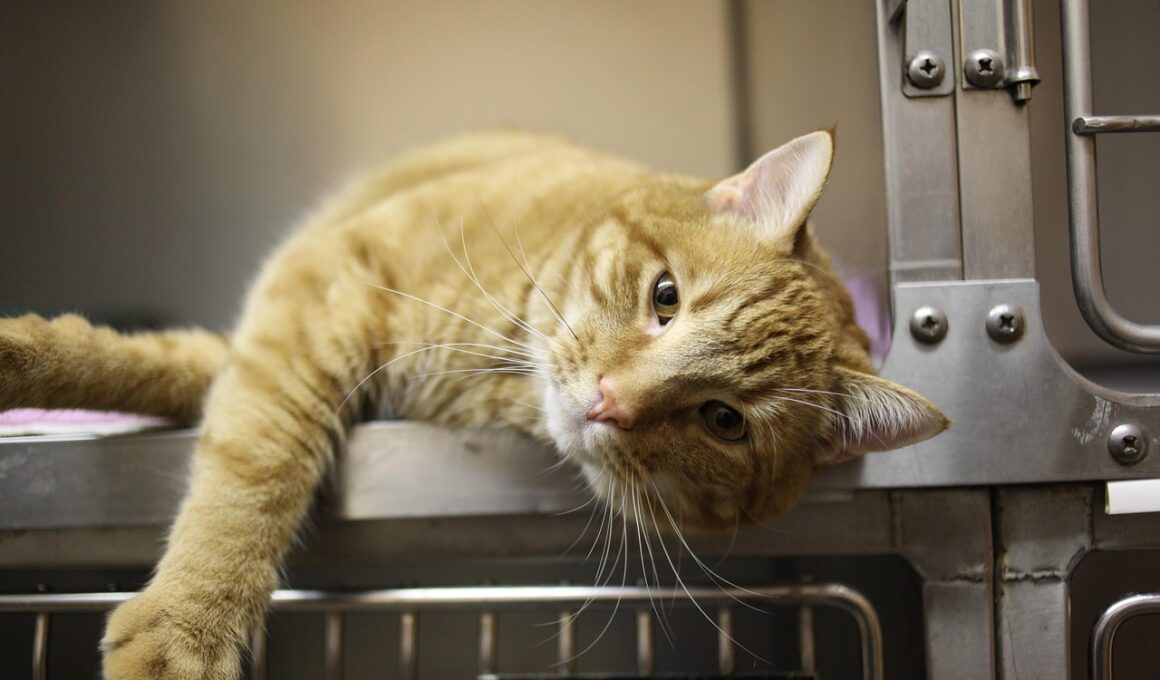Preparing Senior Cats for Vet Appointments
Preparing your senior cat for a veterinary appointment necessitates planning and patience. Start by creating a positive and calm environment at home. Familiarize your cat with carriers or travel boxes several days before the visit. Allow your cat to enter and exit freely, positively reinforcing this behavior with treats and affection. Play with your cat near the carrier or place a warm blanket inside. This will help reduce anxiety. Gradually introduce handling in basic areas like paws and tail to enable smoother examinations during visits. Use rewarding techniques to communicate your own comfort regarding the carrier to help your cat associate it with positive experiences. Consider taking short practice runs to the clinic to help your cat adjust. Consistently reward your senior cat for good behavior. Over time, these strategies will lead to a less stressful experience at the vet’s office. Always consult with your veterinarian beforehand to discuss any specific health concerns about your senior cat. Senior cats may require special considerations, so proper prior preparation is vital.
When preparing your senior cat for a vet visit, ensure to gather necessary items beforehand. These include medical records, medications, and any dietary restrictions or changes that may have occurred since the last visit. It’s essential to inform the vet about any behavioral changes or weight fluctuations you noticed. Create a checklist to help ensure nothing is forgotten. Maintain soothing communication with your cat throughout the journey, speaking in calm, soft tones. Some cats are sensitive to loud noises, and maintaining a quiet, serene vibe is essential. While visiting the vet, provide chances for your cat to explore the environment. Consider allowing your cat some freedom to walk, if safe to do so, inside the clinic. Pay attention to body language. If your cat seems overly stressed, take a step back and allow it some time to adjust. If necessary, request a separate room to limit overwhelming stimuli. Always check in with clinic staff about procedures they may have for handling anxious cats. Taking these measures can help ensure the best possible visit.
Creating a Comfortable Environment
Creating a comfortable environment during vet visits for your senior cat is paramount. Ask your vet if your cat can bring a favorite toy or blanket to help ease anxiety. Familiar scents can greatly comfort a nervous animal. Place familiar items in the carrier to make it feel more like home, adding reassurance during travel and examination. When you arrive at the vet, remain calm as your cat picks up on your emotions. Try to maintain your regular routine before the visit, as consistency serves to reduce stress in pets. Using soft carriers can provide a cozy space for your cat, ensuring an inviting experience. Minimize exposure to potential stressors such as barking dogs and other loud noises by asking to be seated in a quieter area while waiting. If your cat is anxious or fearful, gently talk to them. Use positive reinforcement during the visit, praising your cat for good behavior or allowing them treats. A soothing atmosphere can significantly improve your senior cat’s overall experience at the vet, leading to a more successful visit.
Be aware of any specific health considerations, as senior cats often have unique needs when compared to younger ones. Discuss with your veterinarian the importance of routine wellness checks tailored toward aging cats. Senior cats might require specific vaccinations, blood work, or dental evaluations. Preemptively plan these procedures to ensure thorough assessments are completed during visits. Be honest with the clinic staff regarding your cat’s medical history, which can guide how your vet approaches the appointment. Understanding your cat’s medical background will help the veterinarian formulate appropriate treatment plans. During the exam itself, remain present to give your cat emotional support. The familiar presence of their owner can ease anxiety. Learn the key signs of stress in your cat, which can include hiding, excessive meowing, or aggressive behavior. By monitoring these signs, you can provide information that helps the vet significantly tailor the visit experience. If your cat struggles with stress, don’t hesitate to seek guidance from your vet about possible treatment options, including medications or calming strategies to help prepare.
Recognizing Stress Signals
Recognizing stress signals in your senior cat can help improve their comfort during veterinary visits. Common signs include hissing, trembling, or excessive pacing. Being aware of these stress indicators can assist both you and the veterinary team in properly addressing your cat’s needs. If your cat is overwhelmed, consider taking a break in a quieter area of the clinic. This will allow your cat to relax and gather their composure. Additionally, predictability can ease anxiety. Prepare them for appointments immediately following their regular routine, and limit visual stimuli before leaving home. Right before visiting, try featuring their favorite toys to divert attention from stress. Providing opportunities for exploration will help adapt your senior cat to new environments. The selection of a calming pheromone spray designed for cats can be another helpful tool to ease anxiety. Administering one of these sprays into the carrier is often recommended by veterinarians. Ultimately, ensuring your senior cat does not experience excessive stress during vet visits will only enhance their overall well-being.
A good diet that’s rich in nutrients greatly contributes to the overall health of senior cats. Malnutrition can lead to complications at vet visits. Ensure your cat sees their veterinarian at least once every six months for appropriate assessments and recommendations. Ask about specific dietary needs tailored for aging cats and possible supplements beneficial for mobility or organ health. Share any changes in appetite or drinking habits, as these might signal larger health issues. Queries on hydration strategies with older cats are also appropriate to ask your vet. Remember that senior cats may require dietary adjustments to manage conditions like obesity, kidney disease, or hyperthyroidism. Engaging with your veterinarian about accommodating dietary needs will assist in successful vet visits. Furthermore, share observations regarding behavioral or mood changes that may influence their eating habits. Establishing a reliable feeding schedule can contribute positively to a senior cat’s stability and improve overall health. These small considerations can greatly enhance your senior cat’s quality of life and foster better overall health.
Follow-Up After the Visit
Following up after a vet visit is essential, particularly with senior cats facing increased health risks. Carefully observe your cat for any behavior changes after their appointment, especially if they received vaccinations or other treatments. Alterations in appetite, lethargy, or noticeable discomfort should be noted and relayed to the veterinarian as needed. Keeping a detailed log of any symptoms or behavioral changes can be incredibly useful for ongoing discussions with your veterinarian. Maintaining regular communications with the vet ensures your senior cat’s health remains monitored closely. Ensure your cat has access to plenty of fresh water post-vet visit, as hydration becomes crucial after treatment. If your veterinarian prescribes any medication or dietary changes, diligently follow the directives given. Establishing reminder systems such as smartphone alerts can help you administer medications consistently. Keep regular follow-up appointments as necessary, and keep track of any upcoming vaccinations that may be required. Engaging in post-visit care for your senior cat fosters lasting health management, ensuring they experience a better quality of life.
Building a solid relationship with your veterinarian establishes trust and rapport that will benefit your senior cat. Attend to any concerns raised during visits and follow up on their recommendations timely. Consistent veterinary care over time leads to a better understanding of your cat’s medical history, building stronger relationships ensuring quality long-term care. As you learn more about your senior cat’s needs and preferences, advocate effectively for their health. Engaging with your veterinary team will lead to a deeper understanding of your cat’s care plan. Regular clinics may even offer pet-owner classes or seminars focusing on senior animal health. These can provide valuable insight into keeping your senior cat healthy during its twilight years. They give owners skillful knowledge and empowerment. The collaborative relationship between you and the vet is vital to promoting and maintaining the well-being of your senior cat. When it comes to your feline friend’s health, prioritize advocating for their needs, ensuring they receive appropriate preventive treatments. Remember, a proactive attitude helps safeguard their health always, ensuring they remain happy and healthy throughout their senior years.


